
IkamvaYouth Gauteng hosted a very successful Open Day this past Saturday, 21st of January 2012, at the IkamvaYouth Centre in Ebony Park. The day started at 9:30 am with a spectacular turn out of over 700 people. The hall was filled to capacity and there was a hub of excitement from the learners, parents, volunteers and other supporters.
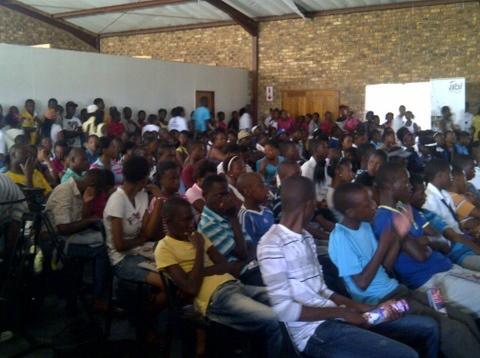
Several activities took place with the Branch Co-ordinator, Joe Manciya, introducing IkamvaYouth to all those who attended. He encouraged the learners to take their education seriously as their future is in their hands and pointed out that IkamvaYouth in Gauteng had opened a second branch located in Ivory Park. The day was filled with lots of information and fun, with Ikamvanites providing entertainment through music and dance. The successful Ikamvanites who matriculated in 2011 also got a chance to speak to the crowd, encouraging their peers to take their education more seriously by becoming an Ikamvanite.
Several sponsors were present, including ABI and The Tzu Chi Foundation. ABI, which was represented by Beverly Selepe, their CSI Specialist, donated the branding that was used on the day, t-shirts, beverages and entertainment. The Tzu Chi Foundation was represented by Howard and announced that they had made four, R20 000 scholarships available to the 2011 successfully matriculated Ikamvanites towards their tertiary education. These successful matriculated Ikamvanites were strongly encouraged to apply.
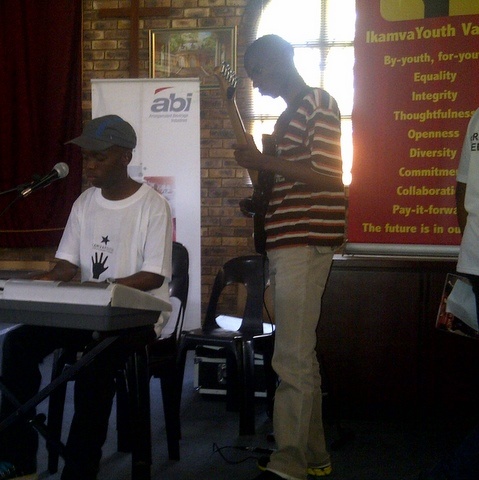
In conclusion, the Open Day was a resounding success, many of the learners took the application forms after the presentations and IkamvaYouth is looking forward to a very successful 2012 with all your continued support.
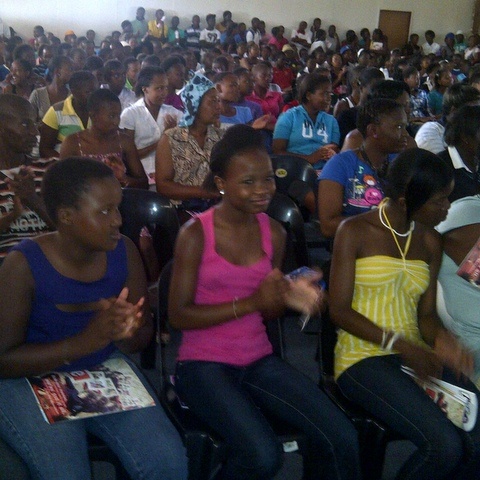

The Makhaza Branch on IkamvaYouth has started the year sprinting! This year we have grown staggeringly to over 200 people with 170 learners and over 30 tutors, extending tutoring times to every day of the week including weekends!
Already the new year has begun with some exciting projects, Khan Academy is in full swing with two Grade 9 groups participating, as well as the programme being extended to grades 10 and 11. Education Without Borders ‘Yes We Can’ maths project has also begun with the new group of grade 8s. We expect the same incredible successes as last year. English programmes have also been implemented at the younger grade levels, as well as regular tutoring and mentoring for the older grades.
Matrics have begun their year with sessions identifying where they would like to be shadowing tutors in their classes later in the year as well as which institutions they’d like to come chat with them about their options. Last year’s matrics are also in the process of being places in various institutions and making sure no one is left behind this year.
Last Saturday we had our first parents meeting of 2012 with an amazing turnout, the hall was packed to capacity where there was a distinct feeling of excitement and hope for the year to come. Of all the students who made it in 4 were turned away, and waiting lists are at an all time high.
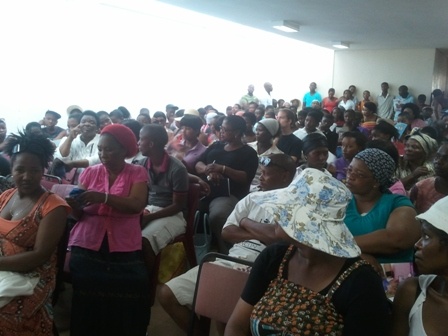
Meeting the parents
We also have two new interns helping us out with tutoring, admin work and setting up databases for the new students. Claire Fisher and Tumisang Madigele are both currently attending the Stanford University study abroad program in Cape Town for their winter term and volunteering at IkamvaYouth.
“Hi! My name is Claire Fisher, and I am from San Francisco, California in the United States. I am a third year student at Stanford University studying political science with concentrations in political theory and American politics.
I am also very passionate about education reform, but my academic and experiential background pertains mostly to education in the United States. I am taking a class here on schooling and education policy in South Africa, so hopefully that will give me a better understanding of the context. I am excited to work at IkamvaYouth to learn more about education in a hands-on way, and I love tutoring, especially in algebra, English, and history! I am already impressed by IkamvaYouth’s incredible reputation, success rates, and mobilization of its students to return to the organization. I also am a huge fan of Khan Academy and am inspired by its ability to use technology to broaden access to quality lesson plans, and so the fact that Ikamvanites use it is amazing.
I wanted to come to Cape Town because of its urban cityscape and beautiful mountains, and I find the cultural complexity of the city due to its historical legacy both challenging and fascinating.
Thanks for having me, IkamvaYouth!”
And Tumisang says, “Hi, my name is Tumisang Madigele and I am from Botswana. I am doing my third year in International Relations at Stanford University. I am interested in working within African communities, especially with organizations whose goal is to empower youth. I am excited to be tutoring kids and helping out at Ikamva. It’s great to work with motivated youth!”

Tumisang and Claire
We are also calling for more tutors this year. Tutoring schedules are as follows:
Grade 8&9 – Monday and Wednesday 3:30pm-5:30pm, and Saturday 9-1pm
Grade 10-12 – Tuesday and Thursday 3:30pm-5:30pm, and Saturday 9-1pm
If you are interested please email Liesel:
liesel@ikamvayouth.org
079 885 4372
Good luck all our Makhaza Ikamvanites!

IkamvaYouth is offering you a unique opportunity to join us at one of 5 branches across South Africa on the morning of 4th January from 11am, when the matric results are announced. Watch the action unfold with IkamvaYouth staff, volunteers, parents and learners. Witness what we hope to be another matric miracle.
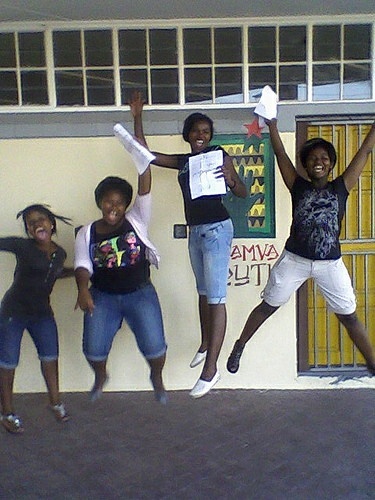
IkamvaYouth is a youth-led educational NGO striving to redress the inequalities and inadequacies that exist in the South African education system. 5 core programmes are offered after-school and on Saturday mornings to hardworking, committed high school youth all over South Africa.
In a country where less than 10% of all youth access tertiary education (SAIRR study, 2009), and 41.6% of 18-24 year olds are not in education/training or employment (CHET,2009), IkamvaYouth is constantly battling against the odds.
However, since its inception in 2003 IkamvaYouth has enabled more than 400 learners from disadvantaged backgrounds to complete high school and have continually achieved un-expected results.
IkamvaYouth’s matric classes have achieved pass rates of between 87 and 100% each year since 2005. More than 70% of the last three grade 12 groups have gained access to tertiary education compared to a township average of approximately 5%.
In 2011 there have been a number of setbacks and problems that have threatened to throw learners off course, yet they have persevered throughout the year and will gather on the 4th January to see if it pays off and if the Ikamvanites once again exceed their own and society’s expectations.
These results determine the futures of these young people. Without a matric pass learners are less likely to access employment and if they do so they will on average earn 5 times less than their graduated peers. Passing matric is the first step for learners on the path to further study, employment and for those from disadvantaged backgrounds it is a rare chance to lift themselves out of poverty.
This is the moment we see if it is possible for the matrics of 2011 to succeed when everything is pointed against them.
We look forward to having you there to speak to learners, volunteers and staff, as the action happens.
Contact: Zoe Mann, 0798854388
www.ikamvayouth.org
Please note that IkamvaYouth is closed from 16 Dec – 4 Jan. Happy Holidays!
Let’s be frank, Black Tuesday came and went for the majority of IkamvaYouth without much fanfare as the secrecy bill passed through parliament. A few Ikamvanites wore black, tweeted or re-tweeted on a selection of the events of the day but – by in large – the day was much like any other with immediate concerns such as passing exams and more mundane everyday issues taking priority.
We can safely assume that this scene was repeated throughout township and rural communities across the country and perhaps Steven Friedman has identified one of the key reasons here. Unfortunately, this lack of interest does not mean there will be no serious repercussions for township and rural communities and therefore Ikamvanites (as Friedman points out). There are also major areas of concern in Pierre De Vos’s account of the technical aspects of the Bill and the powers it gives to government to guard and classify information. Given too that Desmond Tutu refers to the Bill as an “insult to all South Africans” and Jay Naidoo issues warnings against “a dangerous and paranoid direction for our country” it is only wise to reflect on the issues ourselves and how they relate to our own positions.
We’ve said it often that IkamvaYouth strives not only to achieve great impact in what we do, but also strives to be very deliberate in the way we do it. As you know, IkamvaYouth operates as a grassroots organisational democracy underpinned by a set of core IkamvaYouth values that seek inclusive decision-making, collective ownership and consensus wherever possible. IkamvaYouth flips the traditional hierarchical top-down approach on its head with branch representatives (including beneficiaries) hiring/firing branch coordinators and branch coordinators hiring/firing regional coordinators (effectively their bosses in both instances). The IkamvaYouth board, in addition to its legal and fiduciary duties, acts primarily as custodian of the IkamvaYouth values (much like a constitutional court) and at all levels, stakeholders are invited to offer input to meetings when decisions will impact directly on their circumstances.
The upshot of working in this way means that a branch of IkamvaYouth does not just work within a particular community but, more accurately, the branch ends up creating a community and it’s a community anchored in and centred around IkamvaYouth’s organisational values. For this to work though, and for any democratic community to work, we have to have access to as much information as possible or we will make poor decisions and/or disengage from the process. What’s more, as Parker Palmer helpfully points out, democracy is fundamentally a matter of the human heart and the great democratic journey is a continual alignment and re-alignment of our individual and collective hearts with the core democratic values. This is the only way we’re able to find the “courage to create a politics worthy of the human spirit”.
In the IkamvaYouth context, ready access to relevant information for informed and engaged decision-making means a transparency on budgetary issues and sensitive topics like salaries. Everyone at IkamvaYouth knows what everyone else is earning and conflicts are discussed openly and honestly trusting the process that collective wisdom guided by the IkamvaYouth values will continue to move us in the direction we wish to go. Like any good democracy, IkamvaYouth is invariably a little messy on occasion and sometimes meetings can be tense. We are also often less efficient than the authoritarian alternative (except with regards to social impact) but the upside in terms of collective buy-in, pride and ownership is significant and the gains are immeasurable in helping to create community.
The problem with the Information Bill (or at least one of the problems) is that it introduces a new barrier to creating the kind of community we long for in South Africa (and we’ve got more than enough barriers already). It makes it harder for us to be engaged active citizens even assuming that there may be some highly-specific pieces of information justifiably held by the state. The members of parliament who voted for the Bill showed little sign that they held every aspect of the Bill up against the light of the values enshrined in the constitution or gave serious thought to the constitutional principal of transparent governance. They also showed little appreciation of the life-lesson that we can’t be in real community when we keep too many secrets regardless of how honourable our intentions at the outset. In short, it feels like our democratic hearts are unaligned and it is instructive that both Pierre De Vos and Jay Naidoo (above) invoke the issue of “trust” as core to what’s at stake.
Experience has taught us that a necessary condition for each of us to remain active, responsible, democratic IkamvaYouth Citizens is for us to have access to as much information as possible in making properly informed and constructive decisions. It is a vital component of our desire to remain rooted in our values and in authentic community with each other. Similarly then, for us to be active, responsible, democratic citizens sharing our lives together in this country the same must surely apply. We need access to as much information as possible to remain an engaged citizenry and to check how the country’s democratic heart aligns with our treasured democratic values. Democracy is not a passive past-time and we’re going to have to work continuously and exceptionally hard to keep it but since it’s a matter of the heart it will bring us great meaning, sometimes pain and often life.
As Ikamvanites, we have an opportunity to be an example to the rest of the country of a functioning democratic grassroots community in our own small way. We can’t work on healing our hearts and aligning our values without also working on healing the social and economic injustices of the past which is why the ‘what’ we do and social impact remains so important but it is ultimately also the ‘way’ that we do things that will determine whether we remain active and engaged and in authentic community with each other and our country.
Highly Recommended Reading: Healing the Heart of Democracy: Creating a Politics Worthy of the Human Spirit by Parker Palmer. Good democratic soul-food.










 Lloyd Lungu
Lloyd Lungu